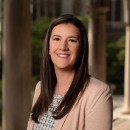School of Social Work News
Pages

 Vaccine Distribution Requires That Medical Establishment Reckon With Institutional Racism
Vaccine Distribution Requires That Medical Establishment Reckon With Institutional RacismProfessor Trina Shanks and Patrick Meehan, Program Manager of the Center for Equitable Family and Community Well-Being, wrote an op-ed for the Michigan Journal of Public Affairs. They write: “As the rollout of COVID-19 vaccines begins, the medical establishment faces a critical challenge: earning Black Americans' trust.”
- January 13, 2021
- Learn more »
- PhD Student Charles Williams II Addresses African Americans Distrust of Vaccine
PhD Student Charles Williams II spoke with the Detroit Free Press about the skepticism in Black communities about the COVID-19 vaccination. As a clergy member who interacts with patients in hospital settings and in his church, Williams qualified to get an early vaccine. He hopes to convince his church members that the vaccine is safe. “As a leader, as a pastor… if I have to be the one to get my arm poked so folks can feel a little bit comfortable about them doing it, so be it,” said the Rev. Charles Williams II, current PhD student.
- January 11, 2021
- Learn more »
 Daphne Watkins Appointed Co-chair of Advancing Public Safety Task Force at U-M
Daphne Watkins Appointed Co-chair of Advancing Public Safety Task Force at U-MProfessor Daphne Watkins is a co-chair of a new task force, Advancing Public Safety at the University of Michigan. President Mark Schlissel and Provost Susan Collins appointed a 20-member task force that will examine what’s working and what needs to be improved with the university’s Division of Public Safety and Security. The task force is among several anti-racism initiatives that U-M officials announced last fall after the deaths of George Floyd and other Black people at the hands of police sparked national conversations around structural racism and policing.
- January 11, 2021
- Learn more »
- Michigan Social Work Statement on Insurrection at the U.S. Capitol
The Michigan Social Work community abhors the attempted insurrection, violence and violation of the law at the U.S. Capitol on January 6. We respect the constitution, Congress and the peaceful transition of power. The chaos in the Capitol building was an attack on our democracy and has no place in our government. We applaud the action of Congress in today's early morning hours to confirm Joe Biden as the next President of the United States of America. We encourage vigilance and swift action to stop any future acts of sedition or insurrection against our lawful government.
- January 7, 2021
- Jamie Mitchell Named Assistant Director of Clinical Research Participation
Assistant Professor Jamie Mitchell has been named assistant director of clinical research participation of the Community Outreach and Engagement program at Michigan Medicine’s Rogel Cancer Center. In this role, Mitchell will look to curate best practices for minority enrollment, providing a toolbox to help investigators consider diversity and inclusivity as they develop their trials. The role leverages work Mitchell is already doing to increase minority recruitment for aging-related studies.
“We as a cancer center community value research that represents more than just the majority population. We want to know our insights and discoveries apply to diverse populations. If we are having trouble recruiting diverse patients to our trials, having someone to think through issues strategically will help make it easier on researchers,” says Mitchell.
- December 18, 2020
- Learn more »
- 2019-2020 Annual Report
It has been a year upended with the pandemic and by the racial injustice that is embedded in the fabric of our society. At the same time the work of faculty, students and alumni continue to be dedicated and inspirational. The world needs social work more than ever, and Michigan social workers have risen to the challenge.
Read the annual report.
- December 17, 2020
 Lindsay Bornheimer Presenting at the 31st Annual Albert J. Silverman Virtual Research Conference
Lindsay Bornheimer Presenting at the 31st Annual Albert J. Silverman Virtual Research ConferenceAssistant Professor Lindsay Bornheimer is presenting a "lightning talk" at the Department of Psychiatry's 31st Annual Albert J. Silverman Virtual Research Conference. She will be presenting her research on the feasibility, acceptability and preliminary effectiveness of a cognitive behavioral suicide prevention-focused intervention tailored to adults diagnosed with schizophrenia spectrum disorders.
“Suicide death estimates are eight times greater for individuals with schizophrenia spectrum disorders as compared to the general population and there is a paucity of evidence-based suicide-prevention approaches tailored for individuals with psychosis. This NIMH R34 study is gaining input from community stakeholders and experts in the field to modify a cognitive-behavioral suicide prevention treatment for individuals with psychosis. We will then test the preliminary effectiveness and implementation of this modified treatment in a randomized controlled trial with providers delivering mental health services and adult clients receiving care at Washtenaw County Community Mental Health,” said Bornheimer.
- December 15, 2020
- Learn more »
- MSW Students Present at the Ann Arbor Human Rights Commission
After an extensive selection process, the Ann Arbor Human Rights Commission selected three groups from Ayesha Ghazi Edwin’s Introduction to Community Organization, Management and Policy/Evaluation Practice classes to present their projects at the commission’s December meeting. The classes spent the semester investigating their equity issues in Ann Arbor, interviewing stakeholders and community members and making a recommendation. The groups that presented were:
- Health and Internet Access: Vincent Asta, Michael Holtzman, Sophie Langerman and Brooke Reiter
- Housing and Racial Equity: Abigail Hampton, Bryant Hepp, Shannon Jajko, Christian Smith and Rachel Vanderbush
- Mental Health and Policing: Mansi Brahmbhatt, Heather Burke, Courtney Callahan and Kayla Harper
The commission works to protect the human and civil rights of the people of Ann Arbor. Its nine members are Ann Arbor residents appointed by the mayor and city council. In addition, Ann Arbor City Council members Elizabeth Nelson and Travis Radina were also present, as was Kathy Wyatt, assistant to the sheriff of Washtenaw County.
The commission members requested that students' projects be shared with the rest of council and other city commissions. All of the groups have been invited to participate in ongoing subcommittee meetings. The projects are stored in an "issue bank" that can be accessed by city council and city commission members.
- December 15, 2020
- Winter Semester 2021
Learning and Teaching during COVID-19 providing strong virtual classrooms and a strong community.
Winter semester has been planned with input from faculty, students, and staff. Planning has taken place with consideration of current and forecasted public health information. In an ever changing pandemic environment, we must continue to be flexible and adaptable- skills that are key to social work practice.
Class Format
Classes will be primarily online. A few electives might be offered as in-person or hybrid, depending on the nature of the class. If students cannot attend those electives in the format offered, students should select an online elective alternative. Faculty are being encouraged to actively build in social elements, as well as connect class material and assignments to co-curricular events taking place in the school and across campus. Information and resources are being provided to faculty to aid this process.
Field Format
Field education disruption related to COVID remains a challenge and requires flexibility as we experience frequent changes in community environments. At this time, field placements will continue to be a blend of in-person, online and hybrid depending on the nature and needs of the agency and the clients being served. Students should use the field decision tree to examine their personal health circumstances to aid in decision making regarding the field format that best fit their needs. If student needs do not line up with the needs of the agency, contact your field faculty to discuss possible alternatives.
Co-Curricular Activities Education + Social
Co-curricular activities will be designed to provide students with a blend of social engagement and educational connection. We are encouraging faculty to consider ways that these co-curricular activities could support classroom learning. For example, could they be used for extra-credit, alternative assignments, etc. Activities might include movies & discussions, topics related to faculty research, outside speakers on related topics, lunch n' learns, etc. Faculty involved with curricular pathways will plan activities and help spread the word to students.
Class Sizes
Class sizes will be reduced to help students build stronger connections with instructors and each other. Most classes will include attendance caps of no more than 20 students per class.
Advising and Support
Faculty advisors are being encouraged to connect regularly with advisees. Students are also encouraged to reach out to advisors if they face challenges. CAPS resources will be sent to students often. CAPS has an embedded counselor at the School of Social Work, Alejandro Rojas, MSW. You can reach him by phone at (734) 763-7894 or [email protected]. Office of Student Services staff will be available to link students to needed resources.
Preparation
Teaching and learning online does not mean simply transferring the skills you use in the residential space to an online environment. Students are strongly encouraged to review resources for remote learning and online learning essential tips SSW compiled about how to be a strong online student. Faculty will continue to be provided with up-to-date training and research about online teaching practices, pedagogy, and tools.
- December 14, 2020
 Danae Ross Selected for Robert Wood Johnson Foundation’s Health Policy Research Scholars Program
Danae Ross Selected for Robert Wood Johnson Foundation’s Health Policy Research Scholars ProgramDanae Ross, Joint PhD student in Social Work and Sociology, Selected for Robert Wood Johnson Foundation’s Health Policy Research Scholars Program. The Health Policy Research Scholars is a leadership opportunity for second-year full-time doctoral students from populations underrepresented in specific doctoral disciplines and/or marginalized backgrounds. The program supports and connects emerging scholars who are committed to bringing about meaningful change and building a national culture of health, which enables everyone in America to live longer healthier lives.
Ross’s research brings an interdisciplinary lens to the study of Black maternal/parental health. Her work centers on the physical and mental health of Black mothers and their infants in sexual and reproductive justice discourses. She investigates how anti-Black culture–particularly related to Black sexuality and parenthood–influences Black maternal/parental-infant lived experiences as well as health outcomes, standard medical recommendations, and health care policy relative to birth and breast/body feeding.
- December 11, 2020
- Learn more »